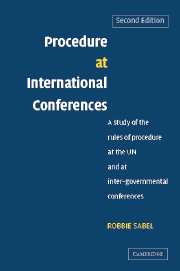 Procedure at International Conferences
Procedure at International Conferences Book contents
- Frontmatter
- Contents
- Preface to the second edition
- List of abbreviations and conference references
- Introduction
- 1 Historical development of rules of procedure of conferences and attempts to establish model rules
- 2 Adoption of rules of procedure
- 3 Rules of procedure and international law
- 4 Invitations, participation and credentials
- 5 Presiding officer and other officers of the conference
- 6 Meetings
- 7 Statements by delegations
- 8 Submission of proposals
- 9 Adjournment and closure of debate
- 10 Amendments
- 11 Withdrawal and reconsideration of motions
- 12 Procedural motions and points of order
- 13 Priorities between different proposals
- 14 Decision taking and method of voting
- 15 Majority required
- 16 Consensus
- 17 Separate votes
- 18 Conduct of voting – interruption of voting and correction of vote
- 19 Languages, records and documents
- 20 Committees
- 21 Suspension and amendment of rules of procedure
- Bibliography
- Index
13 - Priorities between different proposals
Published online by Cambridge University Press: 22 July 2009
- Frontmatter
- Contents
- Preface to the second edition
- List of abbreviations and conference references
- Introduction
- 1 Historical development of rules of procedure of conferences and attempts to establish model rules
- 2 Adoption of rules of procedure
- 3 Rules of procedure and international law
- 4 Invitations, participation and credentials
- 5 Presiding officer and other officers of the conference
- 6 Meetings
- 7 Statements by delegations
- 8 Submission of proposals
- 9 Adjournment and closure of debate
- 10 Amendments
- 11 Withdrawal and reconsideration of motions
- 12 Procedural motions and points of order
- 13 Priorities between different proposals
- 14 Decision taking and method of voting
- 15 Majority required
- 16 Consensus
- 17 Separate votes
- 18 Conduct of voting – interruption of voting and correction of vote
- 19 Languages, records and documents
- 20 Committees
- 21 Suspension and amendment of rules of procedure
- Bibliography
- Index
Summary
Order of voting on proposals
A study of records of international conferences reveals that more time is devoted to debating the order of voting on proposals and amendments than to any other single procedural issue. Delegations will attempt to achieve priority for their proposal as there are obvious advantages to the proposers if a proposal is voted on before an opposing one. This is particularly true when there are similarities between two different proposals and either one of them is likely to attract floating or neutral votes. In such a case, either proposal is likely to get a majority and once the one proposal is accepted, the other alternative is likely to fall. It is therefore often the order in which proposals are put to the vote that determines which proposal will be adopted.
The rules of procedure of the UNGA stipulate:
Voting on proposals
Rule 91
If two or more proposals relate to the same question, the General Assembly shall, unless it decides otherwise, vote on the proposals in the order in which they have been submitted. The General Assembly may, after each vote on a proposal, decide whether to vote on the next proposal.
The UN Model Rules propose:
Rule 60
Order of voting on proposals
1. If two or more proposals, other than amendments, relate to the same question, they shall, unless the Conference decides otherwise, be voted on in the order in which they were submitted. The Conference may, after each vote on a proposal, decide whether to vote on the next proposal. […]
- Type
- Chapter
- Information
- Procedure at International ConferencesA Study of the Rules of Procedure at the UN and at Inter-governmental Conferences, pp. 263 - 284Publisher: Cambridge University PressPrint publication year: 2006


